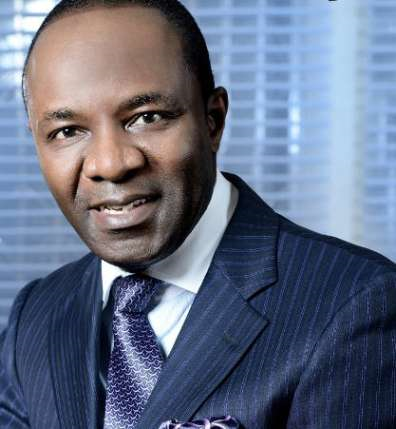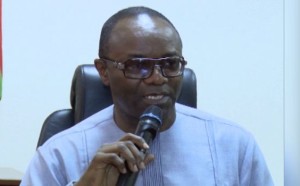Oil
Nigeria set to raise funds to end JV cash call challenge

…to privatize 5000 km oil pipelines network
….as state-owned refineries become autonomus by 2018
By Yemie ADEOYE
ABUJA-THE Federal Government has expressed its readiness to raise funds from international investors and the private sector in 2016 to fund the Joint Venture cash calls between the Nigerian National Petroleum Corporation (NNPC) and International Oil Companies operating in the country.
This is coming on the heels of Government’s decision to privatize the over 5000 kilometer oil pipeline network across the country and ensure a semi-autonomy of all NNPC-owned refineries by 2018 to boost efficiency and profitability.
Nigeria’s Minister of State for Petroleum Resources and Group Managing Director of the NNPC, Dr. Ibe Kachikwu made this disclosure during an interactive session with Nigerians living in Vienna, Austria.
Dr. Kachikwu said already high level discussions are underway with local and international investors to bridge the perennial JV cash call funding gap. He noted that the initiative is geared towards rebottling the Federal Government from bearing the burden of funding capital intensive projects in the upstream sector of the Oil and Gas Industry.
The Minister of State further stated that in the years ahead, the NNPC over 5000 kilometers of pipelines across the length and breadth of the country would be privatized in order to enhance efficient management of the infrastructure and to bring to the barest minimum the high incidence of pipeline vandalism currently plaguing the Petroleum Sector.
According to him, in the next 24 months, Nigerians would see a positive dramatic turn in the refinery model in the country stressing that going forward the new refinery model that would be introduced would not only meet the petroleum products need of the country but that of the West African sub region.
“The new model is that refineries would now buy their own crude oil, refine it and make remittances to the Federal Account Allocation Committee (FAAC). They would operate a semi autonomy system that would enable them to run in a profitable manner,” Dr. Kachikwu affirmed.
It would be recalled that Dr. Kachikwu gave the refineries a 90 day fast track ultimatum that would lapse by December, 2015. He noted that from available reports before me, two of the refineries are likely to meet the deadline.
He informed that the NNPC operations are now being transparently and efficiently handled while adding that the Corporation now publishes its monthly account, a move which he said has inspired a lot of confidence among investors and improve the perception index of the Corporation in a positive light in the eyes of the global community.
Dr. Kachikwu disclosed that a ‘Clean Nigeria after Oil Initiative’ would be introduced in 2016. He said the initiative would set in place a process where all the IOCs operating in Nigeria would adopt global best environmental practices that would guarantee the sustenance of the flora and fauna of communities where they operate even after they are long gone from the country.
“I will engage the IOCs to stand up and get counted in the area of best environmental practices in 2016. This initiative would help the IOCs to maintain a cordial relationship with the communities where they operate and the communities too would be satisfied with the efforts at the end of the day,” Dr. Kachikwu noted.
Oil
NNPC Targets 60% Methane Emission Reduction By 2031
The Nigerian National Petroleum Company Limited (NNPC) has unveiled a bold strategy to reduce methane emissions in the oil and gas sector by 60% by 2031, with an ultimate goal of achieving net-zero emissions by 2060.
This announcement reinforces Nigeria’s leadership role under the Global Methane Pledge initiative and its commitment to tackling climate change.
The Group Chief Executive Officer of NNPC, Mele Kyari, disclosed these plans during a meeting on Thursday with Robert Leahman, the U.S. State Department’s Global Methane Program Manager, and a delegation from Deloitte.
READ MORE: Atiku Gloats Over AUN’s Achievements Ahead Of 20th Anniversary
The discussions, held at the NNPC Towers in Abuja, focused on collaborative efforts to reduce methane emissions through innovative and sustainable practices.
“Reducing methane emissions is not just an environmental necessity but also a strategic imperative for Nigeria’s energy transition. We are leveraging partnerships to adopt global best practices and innovative solutions,” Kyari stated.
Key among these efforts is a pilot project in the Niger Delta, aimed at establishing emissions baselines, mitigating methane leaks, and promoting sustainable operations across Nigeria’s energy sector.
The project, a partnership between NNPC, Deloitte, and the U.S. Bureau of Energy Resources, will utilize data-driven methodologies to pinpoint and address methane hotspots.
Robert Leahman commended Nigeria’s proactive stance, describing it as a benchmark for other nations on the continent.
“Nigeria’s leadership under the Global Methane Pledge sets a standard for the continent. These initiatives will not only help reduce emissions but also drive sustainable development in the energy sector,” he said.
Kyari highlighted the broader benefits of addressing methane emissions, noting its significance for both environmental protection and economic efficiency.
“This collaboration is a game-changer. By addressing methane leaks, we’re reducing waste, saving costs, and protecting the environment. It’s a win-win for our economy and the planet,” he added.
Oil
FG Introduces New Incentives To Revitalize Nigeria’s Oil & Gas Industry
In a strategic move to revitalize Nigeria’s oil and gas sector, the Federal Government has unveiled two key fiscal incentives aimed at attracting investment and enhancing energy security.
The announcement was made by Mr. Wale Edun, the Minister of Finance and Coordinating Minister of the Economy on Wednesday.
The first initiative, the Value Added Tax (VAT) Modification Order 2024, introduces critical exemptions for essential energy products and infrastructure, including Diesel, Feed Gas, Liquefied Petroleum Gas (LPG), Compressed Natural Gas (CNG), Electric Vehicles, Liquefied Natural Gas (LNG) infrastructure, and Clean Cooking Equipment.
Read Also: Atiku Calls For Rotational Presidency Across Nigeria’s Geopolitical Zones
These exemptions are designed to reduce living costs for Nigerians, promote energy security, and accelerate the transition to cleaner energy alternatives.
The second initiative, the Notice of Tax Incentives for Deep Offshore Oil & Gas Production, offers new tax relief options for deep offshore exploration projects.
This measure aims to position Nigeria’s deep offshore basin as a premier destination for international oil and gas investments, boosting the country’s appeal to foreign investors.
These reforms are part of a broader set of policy initiatives, known as Policy Directives 40-42, endorsed by President Bola Ahmed Tinubu.
The directives reflect the administration’s commitment to fostering sustainable development in the energy sector and enhancing Nigeria’s competitive edge in the global oil and gas market.
Business
Tinubu set to approve ExxonMobil-Seplat oil deal, expands CNG bus initiative

By Yemie Adeoye
NIGERIA’s President Bola Tinubu has announced that the protracted ExxonMobil-Seplat upstream oil divestment will be formally approved by the Minister of petroleum within a matter of days, just as he announced his government’s intention to expand the Compress natural Gas, CNG buses initiative.
The President who stated this during his Independence day nationwide broadcast stated that the move is in line with his administration’s commitment to free enterprise, free entry and free exit in investments which is the hallmark of his administration investment policy.
“Fellow compatriots, our administration is committed to free enterprise, free entry, and free exit in investments while maintaining the sanctity and efficacy of our regulatory processes. This principle guides the divestment transactions in our upstream petroleum sector, where we are committed to changing the fortune positively. As such, the ExxonMobil Seplat divestment will receive ministerial approval in a matter of days, having been concluded by the regulator, NUPRC, in line with the Petroleum Industry Act, PIA. This was done in the same manner as other qualified divestments approved in the sector.”
The President also seized the opportunity to plead with Nigerians to be patient with his administration’s reform policies. “As your President, I assure you that we are committed to finding sustainable solutions to alleviate the suffering of our citizens. Once again, I plead for your patience as the reforms we are implementing show positive signs, and we are beginning to see light at the end of the tunnel”.
“Our energy transition programme is on course. We are expanding the adoption of the Presidential Initiative on Compressed Natural Gas for mass transit with private sector players. The Federal Government is ready to assist the thirty-six States and FCT in acquiring CNG buses for cheaper public transportation.
Fellow Nigerians, while we are working to stabilise the economy and secure the country, we also seek to foster national unity and build social harmony and cohesion. Our economy can only thrive when there is peace”. he enthused.

















